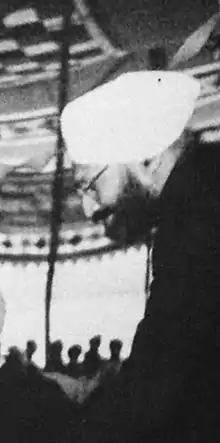Kapur Singh
Sirdar Kapur Singh, ICS (2 March 1909 – 13 August 1986) was an eminent Sikh philosopher, theologian, politician-parliamentarian, and a prolific writer of the twentieth century. As a distinguished linguist he had a mastery over English, Gurmukhi, Persian, Arabic and Sanskrit.
Kapur Singh | |
|---|---|
 Singh in 1964 | |
| Deputy Commissioner | |
| In office 1934–1948 | |
| Member of Parliament | |
| In office 1962–1967 | |
| Member of Legislative assembly | |
| In office 1969–1972 | |
| Personal details | |
| Born | 2 March 1909 lyallpur, Punjab |
| Died | 13 August 1986 (aged 77) Jagron, Punjab, India |
| Political party | Akali Dal |
| Residence | Jagraon |
| Education | M.A (Punjab) , M.A. (Cantub) |
| Alma mater | Lyallpur Khalsa College |
| Profession | Civil Service, Politician, Writer |
Birth and education
Kapur Singh was born in a farming family at village Chakk in the district of Ludhiana. His father's name was Didar Singh. He post-graduated from Government College, Lahore. Later he completed studies in Moral Sciences from Cambridge University.[1]
Career in bureaucracy and dismissal
Returning from UK, Kapur Singh joined the Indian Civil Service (ICS). After serving at a number of administrative posts under the British Raj, he was summarily dismissed from service by Chandu Lal Trivedi, the governor of Punjab, shortly after Indian Independence, while he was serving as the deputy commissioner of Kangra district.[2]
Kapur Singh was incensed at a circular issued by the government that targeted his community.[1] Kapur Singh filed a protest and made the circular public and invited the wrath of Chandu Lal Divedi, the governor of Punjab. The charges leveled against him were of corruption and insubordination. Kapur Singh fought a protracted legal battle but was not restored to the administrative service.[2]
The Circular was CONFIDENTIAL but was disclosed to Akali leader Tara Singh, violating Official Secret Act 1923, who had come and stayed at the residence of Kapur Singh for few weeks. Tara Singh disclosed this matter to PM Nehru, who as an advocate knew the violation of law. The Other Sikh DC at that time was Hardit Singh Malik, ICS. He kept quiet the matter and saved his service ! Nehru told this matter to CJI Sinha who instructed judges not to give any relief to Kapur Singh after his dismissal from service.
Politics
On insistence of Akali leaders, Kapur Singh joined the Akali politics. In 1962, he was elected to the 3rd Lok Sabha as a candidate of the Swatantra Party from the Ludhiana constituency.[3] In 1969 Kapur Singh was elected to the Vidhan Sabha in the new Punjab state.[4] He also remained the National Professor of Sikhism. His 6 th September, 1966 speech of Lok Sabha and Anadpur Sahib resolution of 1973 is magna carta of Sikhs demands and aspirations.
Support of Sikh dharma mission in the West
Kapur Singh made a significant and important contribution to the missionary work of Harbhajan Singh Khalsa outside of India. In April 1979, he went to Los Angeles, where he addressed the Khalsa Council of Sikh Dharma of the Western Hemisphere (later renamed "Sikh Dharma"). In his presentation, he assured the members of the administrative body that while their administrative titles and regalia might differ from contemporary SGPC practice, they fit in well with the overall arch of Sikh history which often was characterized by a diversity of flags among its constituent organizations or "missals."[5] Bhai Sahib also referenced a prophesy of Guru Gobind Singh that Khalsa would rise in the West.[6]
Writings
Kapur Singh was a prolific writer. The books written in English by him include Parasaraprasna (a classic treatise on Sikhism, Published by Guru Nanak Dev University) , The Sacred Writings of the Sikhs (a UNESCO publication), Me Judice (English Miscellany), Contributions of Guru Nanak, Sikhism for Modern Man, The Hour of Sword, Guru Arjan and Sukhmani, Some Insights into Sikhism, Sikhism an Oecumenical Religion [7].Hashish (poems in Punjabi), Saptsaring (Punjabi Biographies), Bahu Vistaar (Punjabi Essays), Pundrik (Punjabi Essays on cultuture and religion) , Bikh meh Amrit (political essays and lectures in punjabi) and Mansur-al-Hallaj (Monograph of a Sufi saint in Punjabi), Sachi Sakhi (Memoirs in Punjabi) His works have also been published by Guru Nanak Dev University, Amritsar and Punjabi University, Patiala. He is also believed to have scripted the Anandpur Sahib Resolution 1973 of the Akali Dal. His SACHI SAKHI (memoirs) of 1979 is most read book on Punjab and Sikhs politics.
Notes
- EncyclopediaBhai Sahib, Kapoor Singh. "Sirdar". Encyclopedia of Sikhism by Harbans Singh. Retrieved 26 April 2020. of Sikhism, Harbans Singh
- Sirdar, Kapoor Singh. "Sachi Sakhi". archive.org (in Punjabi). Jalandhar: Rajrup Prakashan Jalandhar. Retrieved 26 April 2020.
- "Members of Lok Sabha". Parliament of India. Archived from the original on 27 June 2013. Retrieved 11 June 2013.
- Sikh Achievers, Ranjit Singh OBE and Kripa Shankar, 14.02.13
- Bhai Sahib Kapur Singh, "Khalsa Takes a Stand in the West," Beads of Truth, II:3:36-44
- Bhai Sahib Kapur Singh, "Peepal Tree Marks the Growth of the Khalsa Nation."
- Singh, Kapūr (2003). "More writings of same Author (ਇਸ ਕਲਮ ਤੋਂ ਹੋਰ ਲਿਖਤਾਂ)". In Singh, Balwant (ed.). Me Judice. Amritsar: Chattar Singh Jiwan Singh, Bazar Mai Sewan, Amritsar.
